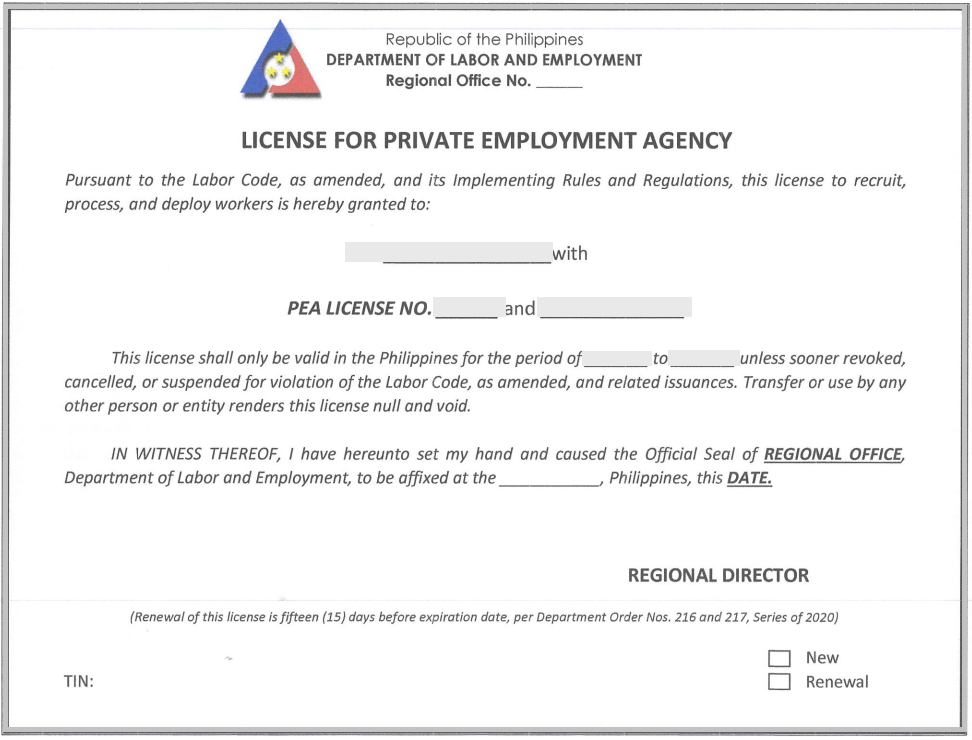In a country where there is a competitive job market or a high rate of unemployment, hiring the best talents to fill open positions usually poses a challenge, especially to companies without a dedicated HR manpower, time, and expertise to do all the work, from job posting to screening applicants and conducting interviews. The cycle of ‘hire and fire’ because of bad hires, i.e., either unqualified or incompatible, not only comes with a financial cost but also results in disrupted business operations and delayed growth.
Outsourcing recruitment services often solves this problem. While every business stays in business because of expertise at something, private recruitment and placement agencies for local employment, also legally termed as Private Employment Agencies (PEAs), are in business because they are experts at hiring people. Additionally, the demand for these agencies is fueled by both the ongoing surplus of jobseekers and the growing number of business startups.
If you are really interested in establishing a PEA, read on, as this article offers a comprehensive guide on how to secure a DOLE license. Or, you may also skip it and just go straight for a call. Let our expert team assist you through the registration process.
What is a PEA?
A Private Employment Agency (PEA), as defined by law, is “any individual, partnership, corporation, or entity licensed by the Department of Labor and Employment (DOLE) through its regional offices to engage in the recruitment and placement of workers for local employment (Section 4, Article I, DOLE D.O. 216-2020).”
The Labor Code of the Philippines strictly limits the engagement in the recruitment and placement of workers, either for local or overseas employment, to Public Employment Offices, Overseas Employment Development Board (OEDB), National Seamen Board, Private Recruitment Offices (PROs), Private Employment Agencies (PEAs), shipping or manning agents or representatives, and other persons or entities authorized by the Labor Secretary.
Moreover, licensed PEAs and other agencies intending to engage in recruitment and placement for overseas employment must also apply for a separate license from the Philippine Overseas Employment Administration (POEA).
How Do PEAs Operate?
If the hiring process is done solely by a company, it is generally called direct hiring. PEAs, on the other hand, take the intermediary roles. When a company or employer hires a PEA, the latter facilitates the recruitment and placement of an applicant and communicates with both the potential employee and employer.
Jobseekers may also initiate the application with the agency that has access to job openings, even those that are not advertised (i.e., also known as the hidden job market). With its extensive network and established relationships with various employers and companies, the agency can effectively assist in job placement based on the jobseekers’ qualifications.
PEAs then charge service fees to the employers based on the contract of service. No fees or costs shall be collected or deducted from the salaries or wages of the placed workers (Section 1, Article VI, DOLE Order 216-2020).
What Types of Workers Do PEAs Cater to?
PEAs play a vital role in improving local labor market conditions by serving as links between jobseekers and employers. They cater to:
Domestic Workers or Kasambahays
These workers are engaged in domestic work within an employment relationship, such as but not limited to general househelp, nursemaid, cook, gardener, or laundry person, but exclude those who perform domestic work only occasionally or sporadically and not on an occupational basis.
Industry Workers
They are not engaged in domestic work within an employment relationship or not failing under the enumeration provided under the Domestic Workers Act or Batas Kasambahay.
Why Do Companies and Jobseekers Avail of PEA Services?
PEAs are specialist recruiters helping jobseekers to find jobs or new roles and companies to fill their open positions with the best talents. They can always be considered as ‘in the know’ brokers between the two parties.
Immediate Hiring
Sometimes, bringing in new talents to the company has to be rushed due to reasons such as the sudden resignation or termination of employees, the creation of a new department or unit, or just an immediate need for an additional workforce. Equally, jobseekers may badly need to land another job after the employment separation. PEAs with a big network of affiliated companies and a database of jobseekers can always process the quick turnaround.
Knowledge of the Market
As industry experts, recruiters can always provide useful information and advice to both companies and jobseekers about what is going on in the labor market, salary rates, career expectations, available skill sets, and hiring challenges, among others. They have a deep insight into what employers and jobseekers really want and need.
High-Caliber Candidates/Companies
Some high-caliber jobseekers with impressive resumes, who may not really be actively looking for work, have their applications lodged with the recruitment agencies and are waiting for open positions in targeted companies. With this setup, companies may have access to these candidates not available through the conventional hiring methods or regular job boards.
Cost Savings
For companies, direct hiring can be expensive due to advertising costs, required HR manpower, and other resources. Bad hires can also be costly in terms of training and turnover. For jobseekers, going through a series of resume submissions and interviews also comes with big financial costs.
Value-Added Services
Most PEAs only offer basic recruitment, selection, and placement services, but there are also those that provide companies with background check services, applicants’ psychometric tests, contract templates, and even market research. Jobseekers may also be offered employment-related and personal development training.
How Do I Register My Company as a PEA?
The Private Employment Agency Law (Act No. 3957) regulates the activities of private employment agencies in the Philippines, setting licensing requirements, guidelines for operation, and penalties for violations, with the Director of Labor having authority to implement the law. Here are the general steps on how to secure a license based on the law:
1. Secure the Usual Business Registrations and Permits.
As business entities, PEAs must first be duly registered with the concerned government agencies, such as the Securities and Exchange Commission (SEC) for corporations and partnerships, Department of Trade and Industry (DTI) for sole proprietorships, Bureau of Internal Revenue (BIR), Business Permit and Licensing Office (BPLO) of the respective city or municipality, and even the barangay. Check out this guide on how to secure the certificates of registration, or contact FilePino today for assistance.
2. Get Qualified for a PEA.
Based on DOLE regulations (DOLE D.O. 217-2020), the following are NOT qualified to engage in the recruitment and placement of workers for local employment as a PEA:
- Those who have pending cases with probable cause or convicted of illegal recruitment, trafficking in persons, anti-child labor law violation, or crimes involving moral turpitude;
- Those agencies, proprietors, partnerships, corporations whose licenses have been previously revoked or canceled by the DOLE under the rules;
- Cooperatives whether registered or not under the Cooperative Act of the Philippines;
- Law enforcers and any official and employee of DOLE;
- Current PEA-licensed sole proprietors are prohibited from securing another license to engage in local recruitment and placement;
- Sole proprietors, partnerships, or corporations licensed to engage in private recruitment and placement for local employment are prohibited from engaging in job contracting or subcontracting activities; and
- Technical-vocational training institutions and other training institutions
3. Prepare the Documentary Requirements.
Apart from the citizenship requirements, there are also various documentary and capital requirements which primarily depend on the business entity. Draft and gather the following requirements:
- Citizenship Requirements. For a single proprietorship, the applicant must be Filipino. For a domestic corporation/partnership, at least seventy-five percent (75%) of the authorized capital stock must be owned and controlled by resident Filipino citizens.
- Capital Requirements. For a single proprietorship, the applicant must have a minimum net worth of One Million Pesos (PHP 1,000,000.00). For a domestic corporation/partnership, the applicant must have a minimum paid-up capital of One Million Pesos (PHP 1,000,000.00), seventy-five percent (75%) of which must be owned by resident Filipinos as evidenced by the Articles of Partnership or Incorporation.
- Office Space Requirement. At least forty (40) square meters of office space (owned/leased for a minimum of one (1) year) must be documented through a proof of ownership or contract of lease.
- Documentary Requirements. These include the business registration documents, NBI clearances, DOLE Certificate of No Pending Case, bank certificates or Articles of Incorporation (AOI), board resolutions, secretary’s certificates, and affidavits. Drafting and notarizing documents normally require a legal expert or a lawyer.
4. File the Application with the DOLE Regional Office.
Pursuant to the DOLE D.O. 216 and 217, Series of 2020, an applicant must secure a PEA license from the DOLE Regional Office concerned in order to legally operate a private employment agency. Filing the application, from the submission of documentary requirements to securing the actual license, may take one (1) to two (2) months. The DOLE Regional Office also schedules and conducts a pre-application orientation (PAO) and an ocular inspection of the office premises and equipment as part of the evaluation of the application.
5. Pay the Necessary Fees.
Based on the latest information, the DOLE PEA license application requires payment of the filing fee (PHP 5,000.00), license fee (PHP 15,000.00), surety bond (PHP 100,000.00) and cash bond (PHP 50,000.). Bonds, accordingly, shall be used to cover all valid and legal claims arising from the use of license and as a guarantee compliance with the provisions of the Labor Code.
6. Receive the DOLE PEA License.
Once the application is approved, the license may already be claimed at the DOLE Regional Office. It is valid for three (3) years, and it serves as proof of the PEA’s due compliance with relevant rules and laws on recruitment and placement and entails protection of jobseekers against illegal recruitment. The application for license renewal must also be filed at least fifteen (15) days before its expiration; otherwise, the renewal of an expired license shall be treated as a new application.

What are the Other PEA-Related Permits/Licenses?
Aside from the regular license, additional DOLE permits are also required for PEAs to operate the business outside the registered scope, e.g., outside the principal place of business and as a branch office.
Authority to Recruit (ATR)
It is a document authorizing a person to conduct recruitment activities for local employment outside the principal place of business other than the PEA licensee. It is issued by the DOLE Regional Office where the applicant intends to conduct recruitment activity (during normal business hours) and is valid in the date and venue as indicated for a maximum of five (5) days.
Authority to Operate Branch Office (ATOBO)
It is a document authorizing a PEA to establish and operate a branch office. It is issued by the DOLE Regional Office which has jurisdiction over the intended location of the branch office and with validity co-terminus with the primary license.
Final Thoughts
In conclusion, Private Employment Agencies (PEAs) play a vital role in improving labor market conditions by serving as links or brokers between jobseekers and employers. They conduct recruitment and placement activities within or outside the office premises under the supervision and regulation of the Department of Labor and Employment (DOLE).
While illegal recruitment, human trafficking, and child labor have always been attached to the way recruitment and placement agencies conduct their business, the Labor Code of the Philippines, the Domestic Workers Act, and DOLE rules and regulations are just a few of the legal foundations for the establishment of these agencies and the protection of workers. The DOLE license, in particular, serves as a hallmark of being compliant with the requirements and qualifications.
… and you might just need our assistance.
Given the legal and technical requirements and processes that agency-applicants have to deal with, the assistance of an experienced and efficient legal compliance team can guarantee an organized filing of the documentary requirements, timely issuance of the license, and an earlier start of your job recruitment and placement operations.
Secure a DOLE license for your Private Employment Agency (PEA) and tap the business potential of the competitive job market in the Philippines. Set up a consultation with FilePino today! Call us at (02) 8478-5826 (landline) and 0917 892 2337 (mobile) or send an email to info@filepino.com.










7 Responses
Very helpful document. But what if we wanted to know if a Certain PEA’s DOLE License Number is still valid. Or we do we verify a DOLE License Number of a PEA.
Regards,
Hi Gregorio! Yes, we may verify the license or registration with DOLE. Thank you!
Hi, thanks for this information. Just want to ask if we are already a corporation and want to register in PEA do we need to add a secondary purpose in our SEC? Thank you
Hi Khristine! Yes, the recruitment of workers for employment must be reflected in the purpose.
Do you run webinars on setting up PEA and related management, finance and operations trainng?
Hi Maximized Mom! While we don’t offer webinars, we’d be happy to arrange a consultation with our corporate lawyers to guide you through the details of DOLE PEA licensing. You can reach us at (02) 8478-5826 (landline), 0917 892 2337 (mobile), or email us at info@filepino.com. Looking forward to assisting you!
MayI please ask if I need to own PEA in order to acquire ATR? Or there is anyway that an individual can apply for ATR without owning a PEA i.e freelancer? Thank you.